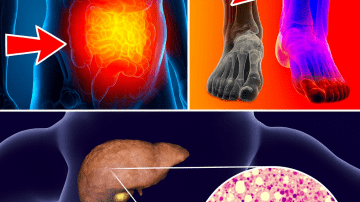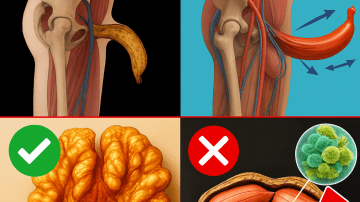What if the nagging discomfort you dismiss as “just a bad meal” or “normal fatigue” is actually your body sounding an alarm? Tucked quietly behind your stomach, the pancreas—a small but mighty organ—plays a starring role in digestion and blood sugar regulation. When it starts to falter, the warning signs can be so subtle they slip under your radar, yet ignoring them could lead to serious issues like chronic pancreatitis, diabetes, or even pancreatic cancer. Over 50% of adults over 40 experience symptoms they don’t connect to pancreatic health, mistaking them for stress or aging. Imagine catching these signals early, saving yourself from bigger health battles. Ready to uncover the 13 early signs of pancreas failure you might be overlooking? Let’s dive into what your body’s trying to tell you—and why acting now could be a game-changer.

The Silent Crisis of Pancreatic Health
Your pancreas works tirelessly, producing digestive enzymes to break down food and hormones like insulin to keep blood sugar in check. When it struggles, the effects ripple through your body, disrupting digestion, energy, and even mood. Yet, the early signs of pancreas failure are often mistaken for everyday annoyances—bloating after a meal, a twinge in your abdomen, or feeling unusually tired. These overlooked clues can escalate into chronic conditions if ignored. Expensive medical tests and treatments can cost thousands, and many people don’t seek help until symptoms become unbearable. What if you could spot the warning signs before they spiral? By tuning into your body’s signals, you can take control of your health and protect this vital organ. Let’s explore the 13 subtle yet critical signs of pancreas failure, starting with the most common and moving to the unexpected.
🩺 13 Early Warning Signs of Pancreas Failure
The pancreas doesn’t shout when it’s in trouble—it whispers. These 13 symptoms, often brushed off as minor, could be your body’s plea for attention. Recognizing them early could mean the difference between a quick fix and a lifelong battle.
🥴 1. Persistent Abdominal Pain That Won’t Quit
A dull ache or sharp stab in your upper abdomen, especially one that creeps to your back, is a red flag. For Lisa, a 45-year-old office manager, this pain flared after eating greasy takeout, a classic sign of pancreatic strain. The pancreas struggles to produce enzymes for fat digestion, causing discomfort that worsens post-meal. If this sounds familiar, don’t chalk it up to indigestion—your pancreas might be signaling distress.
⚖️ 2. Unexplained Weight Loss You Can’t Ignore
Dropping pounds without trying sounds like a dream, but it’s a potential warning. When the pancreas fails to produce enough digestive enzymes, nutrients slip through unabsorbed, starving your body. Tom, a 50-year-old teacher, lost 10 pounds in a month despite no diet changes, a clue his pancreas wasn’t keeping up. If your clothes are suddenly looser, it’s time to investigate.
💧 3. Greasy, Foul-Smelling Stools
Ever notice stools that float, look pale, or smell unusually bad? Known as steatorrhea, this greasy mess signals poor fat digestion due to low pancreatic enzyme output. Lisa was embarrassed by these changes but ignored them until other symptoms appeared. Don’t dismiss this—it’s a direct cry from your pancreas for help.
🌬️ 4. Constant Bloating and Gas
Feeling puffed up after every meal? When the pancreas can’t break down food properly, undigested bits ferment in your gut, causing bloating, cramps, and excessive gas. For Tom, this became a daily struggle, mistaken for a sensitive stomach. If bloating is your new normal, your pancreas might be underperforming.
🤢 5. Nausea and Vomiting After Eating
Frequent nausea, especially after rich or fatty meals, could point to pancreatic inflammation or enzyme deficiency. Lisa felt queasy after every dinner, assuming it was overeating. When nausea persists, it’s a sign your pancreas is struggling to process food efficiently. Don’t brush it off as a one-off.
🚽 6. Chronic Diarrhea That Disrupts Your Day
Watery, frequent stools aren’t just inconvenient—they’re a warning. Pancreatic enzyme shortages lead to undigested food passing through too quickly, causing diarrhea. Tom dealt with this for weeks, thinking it was a bug, until tests revealed pancreatic issues. If diarrhea lingers, it’s time to look deeper.
🩺 7. Sudden Onset of Diabetes or Worsening Control
Your pancreas produces insulin, the key to blood sugar balance. When it falters, glucose levels spike, potentially triggering type 2 diabetes or complicating existing cases. Sarah, a 48-year-old nurse, was shocked when her routine checkup revealed new diabetes symptoms linked to pancreatic dysfunction. Uncontrolled blood sugar? Your pancreas could be the culprit.
🍽️ 8. Loss of Appetite and Food Aversions
When digestion becomes painful or inefficient, eating loses its appeal. Pancreatic issues can make meals feel like a chore, leading to reduced appetite or avoiding certain foods. Lisa started skipping dinners, fearing discomfort, a subtle sign her pancreas was struggling. If food no longer excites you, take note.
🟡 9. Yellowing Skin and Eyes (Jaundice)
A yellow tint to your skin or eyes isn’t just cosmetic—it’s a serious signal. Blocked pancreatic ducts can cause bile buildup, leading to jaundice. Tom noticed this in his mirror and sought help, uncovering early pancreatic trouble. Don’t ignore this vivid warning—it demands urgent attention.
😴 10. Chronic Fatigue That Drains You
Feeling exhausted despite rest? Poor nutrient absorption and blood sugar imbalances from a failing pancreas sap your energy. Sarah felt drained daily, assuming it was her busy schedule, until tests pointed to her pancreas. If fatigue is relentless, it’s more than just tiredness.
🦴 11. Back Pain Without a Cause
Unexplained mid-back pain, especially without injury, can stem from pancreatic inflammation or growths pressing on nerves. Lisa mistook this for muscle strain until other symptoms emerged. If your back aches mysteriously, your pancreas might be sending a signal.
🔥 12. Indigestion That Lingers
Recurring heartburn or discomfort after fatty meals could indicate pancreatic insufficiency. The pancreas struggles to produce enough enzymes to handle rich foods, leaving you with persistent indigestion. Tom ignored this for months, thinking it was diet-related. If antacids don’t help, look to your pancreas.
😣 13. Depression or Mood Swings
Your pancreas influences more than digestion—it affects hormonal and nutrient balance, which ties directly to mood. Malfunction can lead to irritability, anxiety, or even depression. Sarah noticed unexplained mood swings that lifted with pancreatic care. If your emotions feel off, your pancreas might play a role.
🩻 What’s Behind Pancreas Failure?
Several factors can push your pancreas to the brink, often building over years before symptoms appear. Chronic alcohol use is a leading cause, damaging pancreatic tissue over time. Gallstones can block ducts, causing inflammation. A high-fat diet overwhelms the pancreas, while smoking introduces toxins that stress it further. Family history or autoimmune disorders also raise your risk, silently setting the stage for trouble. Understanding these culprits empowers you to make changes—cutting back on alcohol, balancing your diet, or quitting smoking can protect your pancreas before it’s too late.
🩺 When to Act: Don’t Wait for a Crisis
Spotting two or more of these symptoms consistently isn’t something to shrug off. Early detection can halt progression to chronic conditions like pancreatitis or diabetes, or even catch pancreatic cancer in its treatable stages. If you’re experiencing persistent pain, weight loss, or digestive changes, consult a healthcare provider promptly. Simple tests—bloodwork, imaging, or stool analysis—can pinpoint pancreatic issues, giving you a head start on treatment. Lisa and Tom both sought help after noticing multiple signs, catching their issues early and avoiding worse outcomes. Don’t let subtle symptoms escalate—your health is worth the checkup.

🌟 How to Protect Your Pancreas Today
Taking care of your pancreas doesn’t require drastic changes—just mindful habits. Start by eating a balanced diet low in processed fats and sugars to ease the pancreas’s workload. Limit alcohol and quit smoking to reduce toxins. Stay hydrated to support digestion, and manage stress through exercise or meditation, as it impacts hormonal balance. Regular checkups, especially if you have a family history, can catch issues early. Pair these steps with awareness of the 13 signs, and you’re arming yourself against silent threats.
🚨 Why You Can’t Ignore These Signs
The pancreas is a quiet hero, working behind the scenes to keep your body in balance. Ignoring its cries for help—through pain, digestive woes, or fatigue—can lead to irreversible damage. Chronic pancreatitis, diabetes, or even pancreatic cancer don’t announce themselves loudly at first, but their early whispers are clear if you listen. By recognizing these 13 signs, you’re not just reacting—you’re taking charge. Imagine the relief of addressing a small issue before it becomes a big one, reclaiming your energy, comfort, and peace of mind.
🌈 Take Action for Your Health Now
Don’t let subtle symptoms steal your vitality. The pancreas may be small, but its role is massive, and those nagging signs—bloating, pain, or exhaustion—are your body’s way of waving a red flag. Like Lisa, Tom, and Sarah, who acted on their symptoms and protected their health, you can make a difference today. Reflect on these 13 signs: are you experiencing any? Schedule a doctor’s visit, discuss your symptoms, and start your journey to better health. Share this knowledge with someone you care about—it could save them from silent suffering. Your pancreas is speaking—listen now, and thrive.






